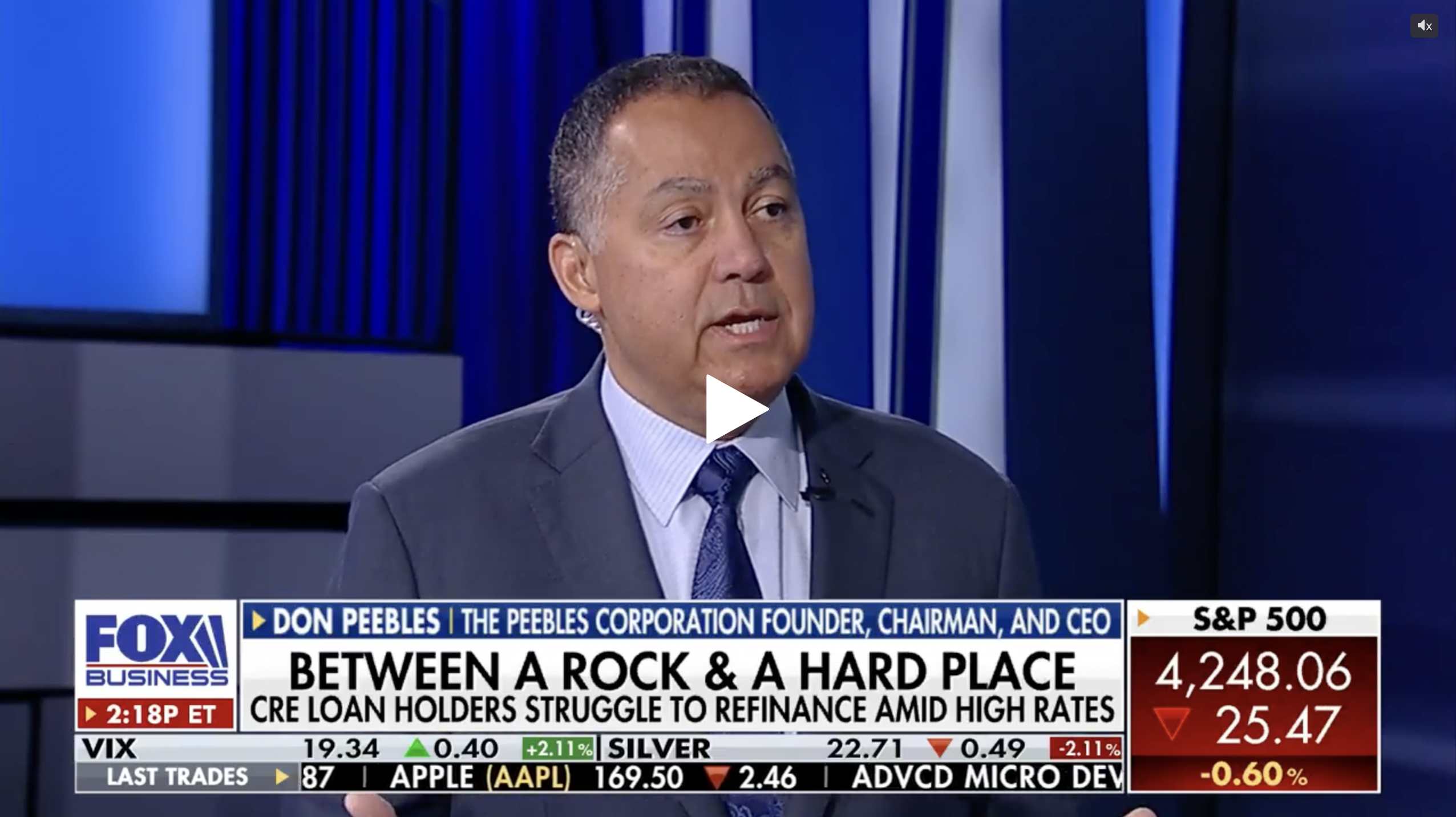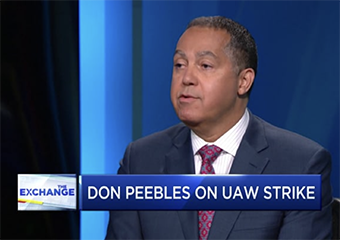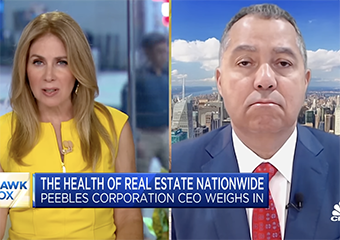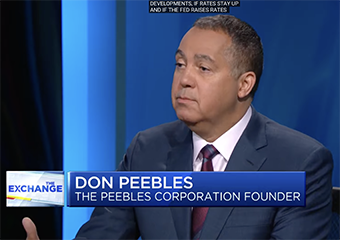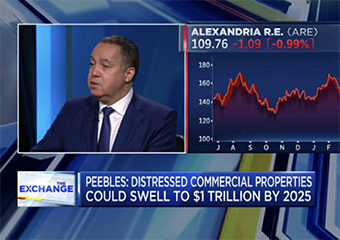The Peebles Corporation founder, chairman, and CEO Don Peebles discusses whether commercial real estate will crash on 'Making Money.'
Don Peebles, chairman and CEO of the Peebles Corporation, joins ‘The Exchange’ to discuss upset over President Biden joining the UAW picket line, Trump’s effort to win Michigan, and concerns about President Biden’s bid for reelection.
Credit: CNBC
By Sharelle Burt
A piece of Black history will be destroyed in Charlotte.
The iconic Walton Plaza building that graces the Queen City skyline is being torn down, the Charlotte Observer reports. The first Black-developed building of its kind between Washington, D.C. and Atlanta hosted some of Charlotte’s finest citizens.
It is the first real estate project led by attorney and congressman Mel Watt and was the professional home to Charlotte legends, including Julius Chambers and Harvey Gantt. Now, its demolition is drawing mixed reviews.
Developer BK Partners will build a new property called Brooklyn Village, consisting of 1,243 residential units, including at least 114 designated affordable units, office and retail space, hotel rooms and 2.5 acres of “open space,” which includes a park. Historians and landmark contributors such as Watt and Gantt say the building’s existence held extraordinary significance when there was a lack of opportunities for Black people.
Built in the early 1970s, Walton Plaza provided a space to support Black business enterprises.
“Its construction alone was an act of defiance in a racially polarized time,” Watt said.
Gantt, the city’s former mayor, leased space there for his architecture firm for a number of years.
“It was a first-class space and there was a good measure of accomplishment to see this succeeding,” Gantt said.
The building survived racial trauma and continued to thrive over the years. On Feb. 4, 1971, someone firebombed Chambers’ law office, just days before Chambers and Westside Associates won a bid to build another project named East Independence Plaza.
New Brooklyn Village construction started in early August 2023 after BK Partners LLC purchased the property from Mecklenburg County for $10.3 million, according to WSOC-TV. However, not all hope is lost to keep the Black legacy alive. The new owners include The Peebles Corporation, a New York-based African-American-owned company, and the Charlotte-based Conformity Corporation.
Peebles Corp EVP Donahue Peebles III said the group recognizes the history behind the land but realizes its time for something new, calling Brooklyn Village South “the first step in a long journey.”
“I think that our focus has always been on paying homage to the vibrancy that was historic Brooklyn…something that could approximate what was the city’s main district for Black people,” Peebles said.
Credit: Black Enterprise
Don Peebles, The Peebles Corporation CEO and chairman, joins 'Squawk Box' to discuss the health of the real estate nationwide, housing market, the state of commercial real estate, and more.
Credit: CNBC
By Brian Pascus
The Peebles Corporation has now entered Carolinas country.
Don Peebles’ eponymous real estate firm has secured $23.75 million in construction and acquisition financing to build the first phase of a 3 million-square-foot, mixed-use urban complex in the Uptown neighborhood of Charlotte, N.C., Commercial Observer has learned.
Stonehill Strategic Capital provided the financing, while Ackman-Ziff negotiated the debt. Further terms of the loan were not disclosed.
The Peebles Corporation is working with Charlotte-based developer Conformity Corporation on the project, which is expected to create an “urban village” of mixed-income housing, office space, hotel rooms and ground-level retail in an Uptown neighborhood that was once a thriving area for Black business development, prior to 20th century gentrification and displacement.
“It’s a historically Black neighborhood that was demolished as a consequence of urban renewal,” explained Donahue Peebles III, executive vice president of The Peebles Corporation: the largest Black-owned real estate firm in the nation.
“There’s a message here of a minority-owned firm leading the development of a neighborhood whose demolition socially and economically disenfranchised numerous folks,” he added. “We’re going to deliver a project that the city and its citizens can stand behind and be proud of.”
Monte Richey, president of Conformity Corporation, echoed these points.
“On land that hasn’t seen private investment in over 50 years, Conformity Corp. and Peebles will create a vibrant future for the Second Ward through its Brooklyn Village development activities,” Richey said in a statement.
The Peebles Corporation bought the first six acres of a planned 18-acre site from Mecklenburg County, which previously used the space to house a municipal parking lot and office building. The Peebles Corporation plans to demolish these public sites and create a 550-unit multifamily complex on the first six acres, before buying up the remaining land and adding the hospitality, office and retail components.
“The objective from there is to build as densely as possible, and to make sure we’re delivering on the attendant policies and benefits that the city and county are expecting,” Peebles III said. “Ultimately, it should set the stage for large-scale, public-private partnerships in the region.”
Peebles III told CO that this is The Peebles Corporation’s first foray into the Carolinas, but the firm identified the site seven years ago and was attracted by the Wake Forest University education system as well as the sprawling healthcare network and thriving banking sector of the Charlotte region — home to Bank of America and Wells Fargo.
“Charlotte has incredible fundamentals — it’s an extraordinarily business-friendly state, temperate from a climate standpoint, and the cost of living is low compared to competing [metropolitan statistical areas],” Peebles III said. “From 2016 to today, we’ve seen Charlotte explode, and it’s done so in a way that’s maintained mobility and affordability, and ultimately developed on its promise.”
Brooklyn Village’s residential component will include market-rate rental apartments and affordable rental units, as well as for-sale condos. The second phase of the larger project will include the construction of an office tower and hotel along Brooklyn Village Avenue to connect Midtown Charlotte with Uptown Charlotte and create a park surrounded by retail shops and stores.
“I think that live-work-play environments are the future of development,” said Peebles III. “You want 18 hour-a-day streetscapes, you want folks there before, during and after work hours, and you want to co-locate mixed-income multifamily with hospitality and office to create an urban environment that brings high quality of life at affordable prices.”
Peebles III said that one in 10 units in the multifamily component of the project will be designated affordable.
The Peebles Corporation was founded in 1983 by R. Donahue Peebles and has offices in New York City, Miami and Washington, D.C. The firm has a national portfolio of more than 10 million square feet and $8 billion worth of property, including the proposed Angels Landing project in Downtown Los Angeles — a 1.2 million-square-foot mixed-use complex of two hotels, condominium, rental units and retail space.
Credit: Commercial Observer
Bess Freedman, Brown Harris Stevens CEO, and Don Peebles, The Peebles Corporation chairman and CEO, join ‘Last Call’ to talk sky high rent prices in NYC and across the country.
Credit: CNBC
By Melissa Lee
Don Peebles, CEO and chairman of the Peebles Corporation, joins 'The Exchange' to discuss a change in sentiment toward the commercial real estate sector, the company's recent loan, and the cost of borrowing in private credit.
Credit: CNBC
By Deidre Bosa
Don Peebles, CEO and chairman of the Peebles Corporation, joins ‘The Exchange’ to discuss a new property law in Florida that restricts Chinese nationals from buying property in the state, the health of commercial real estate in America, and more.
Credit: CNBC
By Brian Pascus
Don Peebles is arguably the most successful Black real estate developer in the United States. For more than 30 years, Peebles has made his mark across America: first in Washington, D.C, through office building development, then in Miami with a number of luxury hotels and condos. Today, he’s looking to build transformational, multibillion-dollar, mixed-use real estate projects in both Los Angeles and New York City with Angels Landing and Affirmation Tower, respectively.
Peebles is also a founding member of the New York Real Estate Chamber, an organization devoted to addressing issues faced by New York City’s minority business community. During the organization’s 10th anniversary celebration on June 9, Peebles took time to speak with Commercial Observer, shortly after U.S. House Minority Leader Hakeem Jeffries and New York Gov. Kathy Hochul addressed the group at the Harvard Club in Midtown Manhattan.
Commercial Observer: You’re arguably the most prominent real estate developer in the building today, so let me ask you: What has the New York Real Estate Chamber meant to you as a businessman?
Don Peebles: Well, I think first of all, what NYREC means to me is you have a diverse group of developers, women and people of color working together to expand the horizon of opportunities for all of us, sharing best practices and experiences and notes, and having someone you can bounce things off. If you look at our industry, it’s heavily under-represented in terms of diversity, and this organization is helping change that quite a bit.
And it’s addressing the needs of the overall community. The pillars of our democracy rest on capitalism, and, in order for democracy to endure, capitalism has to endure, and capitalism can’t endure if it’s inequitable. So it has to be fair, and I mean not fair on outcome, but fair on opportunity.
In your eyes, how has local politics impacted commercial real estate development?
We’re seeing the politics change in New York City and New York state. The politics have changed dramatically. If you look at the leaders of the state, they’re either people of color, or women, or both, and so now the economic environment will follow that. Politics normally leads the way and the economic environment will follow. So I’m a big believer that economic opportunity ought to reflect the diversity of a population’s demographic, and politics ought to lead the way for it. So the New York Real Estate Chamber is about us all working together to make our industry better and help provide housing that’s sorely needed and other jobs and economic opportunity.
I believe REBNY [the Real Estate Board of New York] and the industry as a whole has had such significant resistance in the New York State Legislature and the City Council because of a lack of diversity, because many of these members in the Assembly and the Senate or in the City Council, their populations, their constituents are diverse, and they don’t see the economic benefit of our industry that does more than just provide housing or office space or hotels — it’s jobs.
Today’s the 10th anniversary of the New York Real Estate Chamber. How have you seen it grow and develop in your time?
I’m a founding board member. When I first started doing development business in New York, this organization was in the embryonic stages of being founded, and I joined it because of what it stood for and what was needed. And, at that point, I think I was on the Board of Governors of REBNY, as well. So we had our quarterly meetings for NYREC in the conference room of (law firm) ArentFox, and I think on our first anniversary a new candidate who was leaving the state government to run for Congress came to speak to us, and that was Hakeem Jeffies. We were a small organization, but still, future leaders like Hakeem saw fit to engage with us.
As our organization has grown, we’ve grown in terms of membership and influence within the political spectrum, and just like Hakeem Jeffries has grown from candidate to congressman to Democratic leader, our organization has had a similar trajectory. So I think you’ll see the New York Real Estate Chamber will be consulted and be more engaged in the political and regulatory process that shapes our industry.
As a businessman who has a national footprint, but also has done many deals in New York City, is it different to conduct business in this city and in this state?
I think some places are much more hospitable than others. I think as a Black developer, Atlanta is extremely hospitable. Washington, D.C., my hometown, has always been that way. If you look at one of the more difficult places to do business, it would be Los Angeles. I would think from a transactional and regulatory environment, up till COVID, New York City was the most efficient. It changed after [former mayor] Mike Bloomberg left office, and you saw more headwinds in terms of just going through and doing business as a real estate developer.
It became more difficult and the regulatory oversight expanded into areas like special permits for hotels with 200 rooms. So New York changed — it was the epicenter of entrepreneurship — and part of why the regulatory environment changed was a lack of inclusion. The most business-friendly environment — up till COVID — for real estate was New York City. But it lacked diversity. And, so, you had, in terms of women and minority developers and investors, there were very few of us. And a big part of that was the lack of access to capital, because capital is allocated based on relationships, and so people use their personal relationships and long history as allocators to continue to grow their business, and so that was the biggest impediment.
There’s a lot of young real estate professionals in this room. What’s the best advice you’d give young, Black real estate professionals to make their way in the industry?
Great question. I think one of the important contributions that NYREC makes is to provide a vehicle for those young, early in their career, emerging developers of color or aspiring developers of color, to give information and access. My advice is never expect it to be easy — because it won’t be. But you want to be a student of the business and understand the business and understand the sector you want to go into.
Our company has always grown when we’re doing business in more challenging environments such as recessions, or pullbacks, because then it’s harder to do deals, and when it’s harder to do deals there’s fewer done and there’s great opportunity. The key is being a student of the business, not expecting it to be easy, and not quitting. And once you have made a commitment to a project, figure out the solutions, because it’s going to have lots of bumps in the road.
Just like anything else, if you want to be good at anything — businesses, education, music, journalism, writing — you have to be a student of it and you have to be committed to it. And if you don’t love this business, you shouldn’t do it because it’s a business of headaches, lots of headaches, lots of problems, lots of risk. You have to really kind of love it, and part of why I’ve had some success is I actually like the business.
What would you tell young people in the industry who are growing more concerned about equity and fairness?
I’d tell them business is a place to bring about change because we can use capitalism as tools of transformation. We can use the real estate business as tools of transformation because how we do business can have a major impact. Our company is committed to at least 35 percent of all our contacts going to women and minority firms round the country — that is a vehicle of transformation.
Also, as business people, we expect excellence because we can’t stay in business without it. So I don’t think we do diversity for the sake of diversity, but we look at things with a wider lens. People should look when they go into this business to use it as a tool for transformation.
Where do you want to see NYREC 10 years from now, at the 20th anniversary celebration?
I would like to see the conversation different, meaning we have gotten to a place where everyone is getting essentially fair access to capital, fair access to opportunity, so it’s a discussion about how the industry can make our society better, how NYREC can make New York City better, how can we provide opportunities and engage and expand the universe of talent that comes to the industry.
I’d like the conversation to be about how all of us have put more back into the community — started schools, provided scholarships, fully engaged in things successful businesses do, which is to invest in their community. But I would hope we would have turned the page in terms of economic inclusion.
Credit: Commercial Observer
By Neil Cavuto
The Peebles Corporation founder and CEO Don Peebles joined ‘Cavuto: Coast to Coast’ to weigh in on Barbara Corcoran’s warning that a ‘bloodbath’ is coming for real estate.
Credit: Fox Business
THE PEEBLES CORPORATION®
NEW YORK
BOSTON
WASHINGTON, DC
CHARLOTTE
ATLANTA
MIAMI BEACH
SAN FRANCISCO

